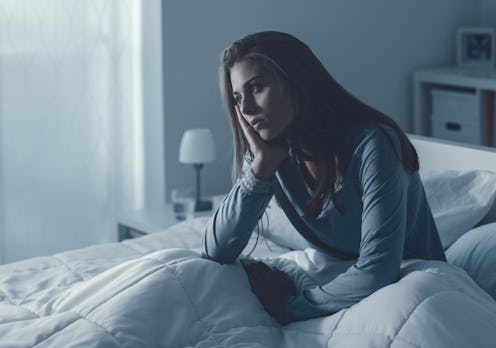Life
7 Everyday Sleep Issues That Can Actually Be Signs Of A Sleep Disorder

Most people have experienced temporary sleep problems from time to time. Tossing and turning, restlessness, snoring while you are snoozing, falling asleep at your desk — a bad night of sleep definitely isn’t pleasant, but usually, it’s pretty easy to deal with the temporary fatigue the following day. However, if your sleep issues start to become more consistent and interfere with you daily activities, it could actually mean you have a sleep disorder.
According to the American Sleep Association, 50 to 70 million adults in the U.S. are estimated to have some type of sleep disorder. There are quite a number of sleep disorder, but some of the most common disorders include insomnia, sleep apnea (aka, breathing pauses that interrupt your sleep cycle), and restless legs syndrome. Sleep plays an important role in physical and cognitive health; it can improve your memory and concentration, boost your mood, decrease inflammation, and give your immune system a bump.
“While sleep deprived, we are three to five times more likely to catch a cold when exposed to airborne rhinovirus — a sneeze from someone who has a cold,” Pete Bils, Vice President of Sleep Science and Research for Sleep Number, tells Bustle. “Insufficient sleep has been implicated as a factor in seven of the fifteen leading causes of death in the United States.”
It’s an understatement to say that practicing good sleep hygiene and getting restful sleep on a regular basis is important to your overall health. A trip to your doctor may be necessary if you believe your sleep problems go beyond the run-of-the-mill bad night of sleep. Here are what seven ways to tell your sleep issues might be a sleep disorder, according to experts.
1You're Constantly Tired During The Day
If you're constantly exhausted throughout the day, there's a chance that your tiredness may be caused by an underlying sleep disorder. "How you feel during the day is often one of the most important indicators of how you are sleeping during the night," Dr. Mary Ellen Wells, the director of Neurodiagnostics and Sleep Science at the University of North Carolina School of Medicine, tells Bustle. "Excessive daytime sleepiness can be a result of many different sleep disorders, including insomnia and sleep apnea."
Dr. Jacinta M. Jiménez, a clinical psychologist and the Head of Coaching at BetterUp, tells Bustle, "If you’re experiencing excessive daytime sleepiness for an extended period of time, it may be a signal you that you need to consider whether you’re getting enough restorative sleep."
2You Never Wake Up Refreshed
"During a normal sleep cycle, your body alternates between various stages of sleep, allowing your body and brain to enter into deep restorative levels of sleep that should leave you feeling alert, refreshed and awake the next day," Jiménez says. However, if you still seem to wake up fatigued even after catching seven to nine hours of shuteye, she warns this is telltale sign you have more serious sleep issues going on.
3You Make Gasping Or Snorting Noises In Your Sleep
Wells says an almost certain sign that you're dealing with a sleep disorder is "gasping or making snorting noises during the night, where your breathing is interrupted, and it might happen many times, for several seconds at a time." This is a typical symptom of sleep apnea. "People often aren’t even aware they are doing this, and only find out when a bed partner tunes them in to the problem."
So, if you have a roommate or partner you trust, definitely ask them if they've heard you making these noises at night so you can let your physician know.
4Or, You Snore
We all have that one family member or friend who snores louder than traffic (or you're that person), and there's a good chance it's the result of a sleep disorder. "Snoring may be more than just annoying — it may be a sign of sleep apnea," says Wells.
5You Can't Keep To A Normal Sleep Schedule
According to Dr. Jiménez, "If you’re consistently having trouble falling asleep or staying asleep taking 30 minutes or more to fall asleep — waking up mid sleep, and tossing and turning for an hour, for example — it may be a sign of something more serious."
If you're sleep/wake cycle is a total mess no matter how many times you try to establish a steady sleep schedule, it could specifically be because of a circadian rhythm disorder — a family of sleep disorders that basically means your body's internal clock is all over the place.
6Your Mental And Cognitive Health Are Affected
If you're having trouble focusing, staying alert, or remembering things for seemingly no reason, a sleep disorder could be the underlying issue. "Cognitive and functional impairment can be a result of sleep disorders, and lack of sleep," Wells tells Bustle, adding that "unexplained moodiness" is also a common symptom of insomnia.
7You Notice Irregularities On Your Sleep Log
Many people keep mood or dream logs, but keeping a sleep log can give you so much insight into the potential symptoms of a sleep disorder you're experiencing. Dr. Jiménez explains," "If you suspect you have a sleep disorder, it is important to begin gathering data about your sleep. Specifically, starting a sleep log that captures hours slept, quality of sleep, [and] factors that may have affected your sleep."
She says, "It’s also important to record how you feel upon waking each morning and how rested and awake you feel throughout the day. The more information you can gather, the better chance you have in understanding the source of your sleep problems."
All-in-all, Dr. Wells says, "If you suspect you have a sleep disorder, it’s time to visit your doctor for proper diagnosis and treatment." Once you find a treatment method that works for you, sleep disorders can become much more manageable.